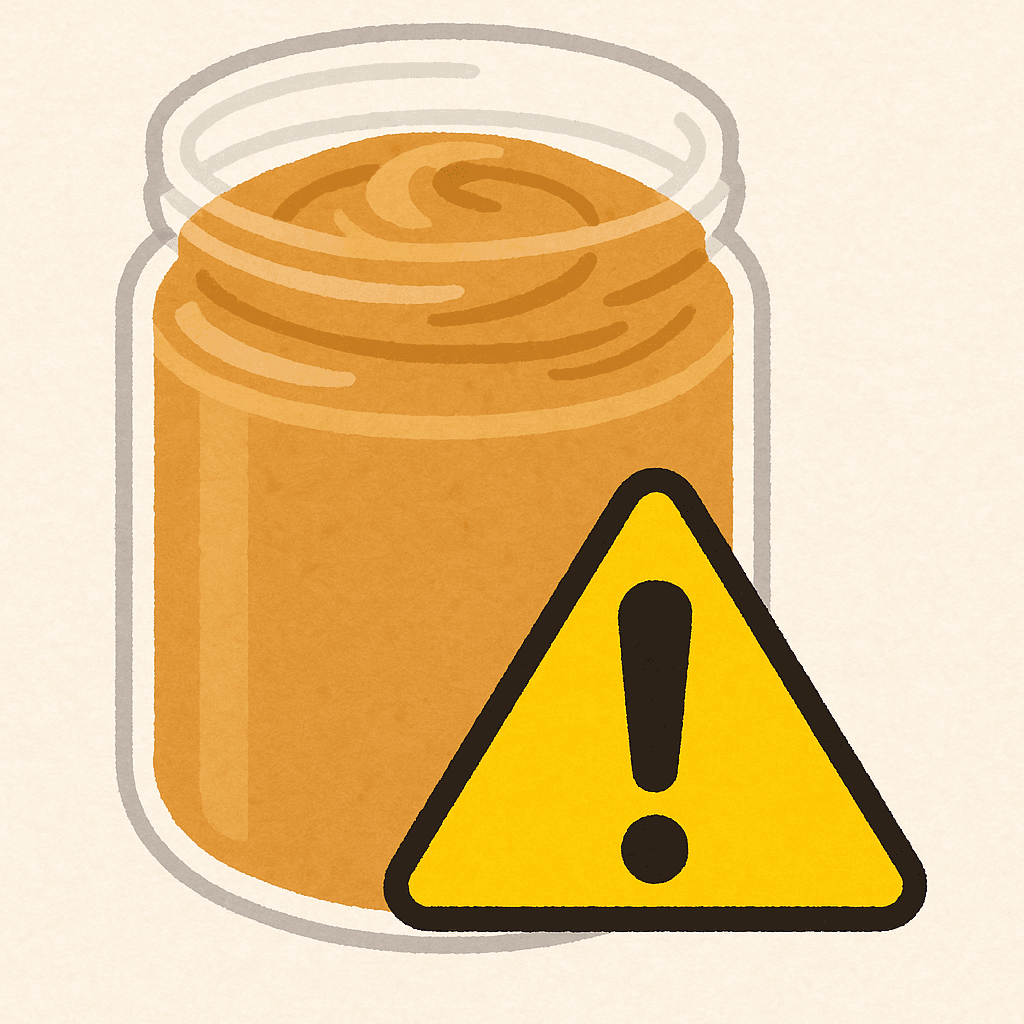The Deadly Peanut Butter Outbreak of 2008–2009
In late 2008 and early 2009, a wave of salmonella food poisoning swept across the United States. The source turned out to be a seemingly innocent ingredient: peanut products. Peanut Corporation of America (PCA), a peanut processing company, was identified as ground zero for the outbreak. By the time the outbreak was contained, nine people had died and at least 714 had fallen ill after eating foods made with PCA’s contaminated peanuts. It became one of the most extensive food recalls in U.S. history, affecting 46 states and over 3,900 products from crackers to ice cream that used PCA ingredients. The company’s peanuts were everywhere – in school snacks, packaged cookies, and even pet treats – which is why the impact was so widespread. As the crisis unfolded, PCA halted operations and soon declared bankruptcy amid mounting lawsuits.
Consumers were alarmed that a staple like peanut butter could turn deadly. Health officials investigating the outbreak found a matching strain of salmonella in PCA’s peanut products, definitively linking the illnesses to the company. Major food manufacturers that had bought PCA’s peanut paste or butter had to issue recalls of their own products. The entire peanut industry suffered a blow to its reputation and sales. Clearly, something had gone very wrong inside PCA’s processing plants to allow this contamination to happen. But as investigators would soon learn, it wasn’t just an accident or bad luck – it was the result of negligence and shocking misconduct at the highest levels of the company.
Investigation and Trial: How the Truth Came Out
When Food and Drug Administration (FDA) inspectors and criminal investigators descended on PCA’s peanut plant in Blakely, Georgia, they uncovered disturbingly unsanitary conditions. According to court documents, some peanut containers were found “covered in dust and rat crap,” and the facility had issues like mold, roaches, leaky roofs, and even gaps where rodents could enter. It was the perfect breeding ground for bacteria. This explained how salmonella could have contaminated the peanuts – but the investigation also revealed that PCA’s leadership knew about the contamination and shipped the products anyway.
Internal company emails and records showed a pattern of fraudulent and dangerous practices. In 2007 and 2008, PCA’s own internal tests came up positive for salmonella at least a half-dozen times, indicating contaminated batches. Instead of immediately disposing of those batches and deep-cleaning the plant, PCA’s management did something almost unbelievable: they sometimes retested the peanuts until they got a “clean” result, then shipped them out. In other cases, they simply shipped products before receiving lab test results at all. This was essentially gambling with public health. One particularly damning email from PCA’s president, Stewart Parnell, became a centerpiece of the case. When informed that a customer’s order would be delayed until pending salmonella test results came back, Parnell infamously replied, “Just ship it. I can’t afford to lose another customer.”. That short sentence — “Just ship it” — would come to symbolize the utter disregard for safety in pursuit of profit.
The federal investigation also found that PCA employees had falsified certificates and lab results to make it appear that peanut shipments were safe. In reality, some of those shipments were tainted with salmonella. By shipping that peanut butter and paste to food makers across the country, Parnell and his company set in motion the outbreak that harmed hundreds of people. These revelations led to a federal criminal indictment. Stewart Parnell, his brother Michael Parnell (a food broker for PCA), and Mary Wilkerson (PCA’s quality assurance manager) were charged not only with food safety violations but also with serious federal crimes like fraud and conspiracy. Prosecutors essentially treated the case like a white-collar crime combined with a public health crime: the Parnell brothers were accused of defrauding their customers by knowingly selling a contaminated, misbranded product, and obstructing justice by covering it up.
The trial, which took place in 2014, was dramatic and lengthy. It lasted over two months and included testimony from food safety experts, former PCA employees, and victims of the outbreak. The evidence painted a chilling picture of corporate negligence. Jurors heard how company executives had assured food buyers that their peanuts were safe without having test results to prove it, and how they ignored or hid positive salmonella tests. In September 2014, the jury rendered a verdict: Stewart Parnell was found guilty on 67 federal felony counts, including knowingly shipping adulterated food and conspiracy. Michael Parnell was also convicted on multiple counts, and Mary Wilkerson was convicted on obstruction of justice for hiding information from investigators.
A Landmark Sentence for Food Safety Violations
One year after the verdict, in September 2015, Stewart Parnell stood in an Albany, Georgia courtroom to receive his sentence. He was 61 years old, and the outcome would determine whether he’d ever walk free again. The judge sentenced Parnell to 28 years in federal prison – a punishment so stiff that it might as well have been a life sentence for him. In fact, it was the harshest criminal penalty ever imposed in a food poisoning case in U.S. history. Michael Parnell, his brother, received a 20-year prison term, and Mary Wilkerson was sentenced to 5 years. For context, in prior food contamination cases, punishment was usually much lighter. For example, executives involved in a deadly 2010 egg salmonella outbreak got only a few months in jail, and others in a fatal 2011 cantaloupe listeria case got probation. No one had seen a prison term of nearly three decades for a corporate food safety lapse – this truly was a landmark moment.
Why did this case result in such an unprecedented sentence? The scale of harm was one factor: nine lives lost and hundreds sickened is a grave matter. But what really set this case apart was the intentional misconduct. Stewart Parnell wasn’t just negligent; evidence showed he knowingly and willfully endangered the public. In the judge’s eyes (and in the eyes of devastated victims’ families), this wasn’t a mere regulatory violation – it was akin to a form of manslaughter or homicide, committed through corporate actions. One victim’s family member even referred to Parnell as “a murderer” in court, underscoring the depth of harm caused.
At the sentencing, some of the people who fell ill (and families of those who died) spoke directly to Parnell about the pain he had caused. Through tears and anger, they described the suffering that a simple peanut butter cracker had brought into their lives. In a brief address to the court, Parnell finally apologized, saying, “I’m truly sorry for what happened,” and asked for forgiveness. It was a stark contrast to 2009, when he had refused to testify before Congress about the outbreak. His apology, coming so many years later, rang hollow for many. As one grandson of a victim said, it was “too little, too late”.
The 28-year sentence sent shockwaves through the food industry. A U.S. attorney involved in the case called it “a landmark with implications that will resonate not just in the food industry but in corporate boardrooms across the country”. The message was clear: if corporate executives choose profit over safety and innocent people die as a result, they can face serious consequences, including criminal prosecution and long prison terms. This case marked a new era of accountability for food manufacturers. As food safety lawyer Bill Marler (who represented many victims) noted, “The fact that he was prosecuted at all is a victory for consumers.” Executives in other companies began paying close attention, realizing that food safety is not just a regulatory checkbox but a legal responsibility that carries personal risk.
Personal Injury Law Principles on Display
Beyond making headlines, the PCA case is also a textbook example of several important concepts in personal injury law. When we talk about “negligence”, “duty of care”, “strict liability”, or “punitive damages”, those terms might sound like legal jargon. But this real-life story illustrates what they mean in a way anyone can understand. Let’s break down how the Stewart Parnell case exemplifies each of these principles:
Negligence and Duty of Care
In personal injury law, negligence means someone failed to act with the care that a reasonably prudent person would use in a similar situation, and as a result, someone else got hurt. To put it simply, it’s about carelessness that causes harm. A related idea is the duty of care – a legal obligation to avoid causing harm. For example, companies that produce food owe a duty of care to consumers to make sure their products are safe to eat. Stewart Parnell and PCA absolutely had this duty. They were expected to follow food safety standards, test for contamination, keep the plant clean, and prevent dangerous peanuts from ever reaching a family’s pantry.
Negligence isn’t just a feeling; it’s a legal claim with specific parts that must be proven. In fact, there are four elements of negligence in law:
- Duty of Care – The defendant (person or company) owed a legal duty to the plaintiff. (In our case, PCA had a duty to provide safe peanut products to consumers.)
- Breach of Duty – The defendant breached (violated) that duty by acting (or failing to act) in a certain way. (Here, shipping peanuts they knew might be contaminated was a blatant breach of their duty.)
- Causation – The defendant’s breach of duty caused the harm. This has two parts: actual cause and proximate cause. In the PCA outbreak, there was clear evidence that the contaminated peanuts caused people to get salmonella poisoning.
- Damages – The plaintiff suffered actual harm or losses as a result. In a food poisoning case, the damages could be medical bills, pain and suffering, lost wages, or in tragic instances like this, the loss of life.
All four elements were present in the peanut butter outbreak scenario. Duty was established (food companies must ensure safety), breach was obvious (knowingly shipping tainted food is a breach of any duty of care), causation was proven by scientific tracing of the illness to PCA’s peanuts, and damages were painfully real (hundreds of people sick, nine dead, countless families affected). In civil personal injury lawsuits, victims could sue PCA (and its officers) for negligence on this basis – and indeed many did file suits in 2009.
What makes the PCA case extraordinary is that the negligence was not an oversight or a one-time mistake; it was intentional and repeated misconduct. This goes beyond ordinary negligence into the territory of gross negligence or even willful misconduct – basically, a severe form of negligence where someone knowingly exposes others to danger. Stewart Parnell’s actions, like sending out food despite positive salmonella tests, exemplify this high degree of negligence. It’s the kind of behavior that not only makes one liable for injuries in civil court, but also justifies punishment by criminal courts.
Strict Liability for Defective Food Products
Now, you might wonder, what if Stewart Parnell hadn’t known about the contamination? What if PCA’s processes were careless and caused contamination, but there was no smoking gun email saying “Just ship it”? Would victims still have a case? The answer is usually yes, thanks to the concept of strict liability in product law. Strict product liability means that a manufacturer or seller can be held legally responsible for injuries caused by a defective product even if they weren’t negligent. In many states, food is considered a product like any other. If you sell food that turns out to be contaminated and it harms someone, you can be held strictly liable for the damage. The victim does not have to prove that you were careless – they only need to prove that the food was unsafe and caused their illness.
In the context of PCA, even if the contamination had been an accident no one knew about, the company could still be sued under strict liability. The law recognizes that when it comes to products meant for consumption, especially food, the “innocent consumer” shouldn’t bear the loss for a bad product. The burden is put on the companies profiting from the food to ensure its safety. This is an important protection for the public. It means that victims of food poisoning don’t have to climb into the mind of a company to prove what it should have done; it’s enough to show the product was contaminated and caused harm. For PCA’s victims, strict liability was another avenue to hold the company accountable, alongside the negligence claims.
It’s worth noting that in the PCA criminal case, strict liability wasn’t the charge – because strict liability is typically a civil law concept. The criminal charges required proving fraud and knowing wrongdoing. But we discuss strict liability here to highlight that food companies can be on the hook even for unintentional contamination. In practice, most reputable food businesses treat any contamination, even accidental, with utmost seriousness because they know they could be liable. And in PCA’s situation, the presence of intentional bad acts didn’t negate strict liability; it simply added negligence and criminal fraud on top of it.
Punitive Damages and Punishment
When a person is injured by someone else’s wrongdoing, the legal system primarily aims to compensate the victim for their losses. These are called compensatory damages – things like medical expenses, lost income, and pain and suffering. However, sometimes a defendant’s conduct is so outrageous or reckless that the law allows an additional category of damages: punitive damages. Punitive damages are not meant to compensate the victim, but rather to punish the wrongdoer and deter others from similar behavior. They’re essentially a financial penalty for egregious conduct in civil cases.
The Stewart Parnell case is a classic scenario where punitive damages would be on the table. Think about it: PCA’s actions went beyond a minor oversight; they showed a reckless disregard for human life. In a civil lawsuit, a jury could very well decide that apart from paying for the victims’ medical bills and other losses, PCA (or its executives, if they were defendants) should pay an additional sum as punishment. This is especially true when the wrongdoing is intentional, as it was here. Punitive damages also serve a societal purpose – they send a message that such behavior will cost you dearly, hopefully discouraging others in positions of power from making the same terrible choices.
In reality, PCA as a company didn’t have a future (it was bankrupt and defunct by 2009), so any punitive damages in civil suits would mostly be symbolic unless others (like insurers or parent companies) were on the hook. Nonetheless, the concept is important. Punitive damages in civil law mirror what a severe prison sentence represents in criminal law. In the criminal case, Stewart Parnell’s 28-year prison term was essentially a punishment to fit the crime – meant to penalize him and deter others. In a personal injury lawsuit, punitive damages play that role. They’re relatively rare and reserved for the worst offenders, but PCA’s behavior certainly qualifies.
It’s also worth mentioning that the outrage and harm from this case fueled changes beyond the courtroom. The PCA scandal helped motivate the passage of new food safety legislation – the Food Safety Modernization Act of 2011, which strengthened the FDA’s oversight and preventive controls. This shows another way society responds to egregious negligence: by reforming laws and regulations to prevent it in the future. In sum, the punitive measures – whether jail time, hefty fines, or damage awards – underscore the principle that those who willfully endanger others should face severe consequences.
Accountability and Legal Recourse
The story of Stewart Parnell and the Peanut Corporation of America stands as a somber lesson in both food safety and legal accountability. It demonstrated that no one is above the law, not even corporate executives in corner offices. When companies violate the public’s trust and innocent people are hurt or killed, the consequences can be life-altering for all involved. Families lost loved ones because of a basic food most of us eat without a second thought, and an executive who chose greed over safety will spend much of the rest of his life behind bars as a result. This case was a wake-up call, leading to safer practices in the food industry and greater awareness of corporate responsibility.
Importantly, the PCA case also exemplifies how the principles of personal injury law protect all of us. Concepts like negligence, duty of care, strict liability, and punitive damages aren’t abstract legal terms—they are mechanisms that help ensure we all have recourse when wrongdoing causes harm. Most companies will hopefully never be as reckless as PCA was, but if you ever do find yourself sick, injured, or worse because someone failed in their basic duty to keep others safe, remember that the law is on your side. When negligence leads to harm, legal recourse is available to help victims seek justice and hold wrongdoers accountable.


